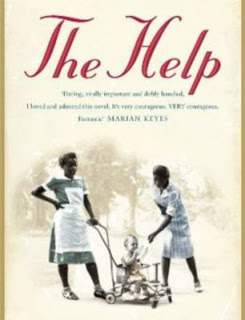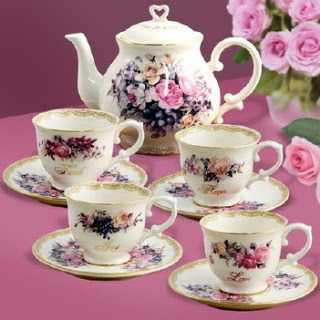Who owns the virtual teaset?
A few months ago, I started a book group with some friends. Yesterday we met to discuss the fourth and far and away the most popular title so far: Kathryn Stockett's The Help. In fact, so much did we like it that we've made a date for us all to go and see the film together next month.

For anyone who has been living at the bottom of a hole for the last two years, The Help is a first novel by White American Kathryn Stockett, who was brought up in the South, largely by Black maids. It is set in the early '60s and features one brave young White woman who has lost contact with her Black maid in mysterious circumstances, which no-one will explain to her.
Skeeter wants to be a writer and has a slender contact with a publisher in New York City; all she has to do is come up with a commercial idea. Gradually a project grows of getting the Black maids in Skeeter's community to talk about their lives. The "book within a book," called just Help, has to be published anonymously, or the maids would certainly lose their jobs. But the truth begins to leak out.
It's a wonderful book, told in the first person by several voices, prime among them Aibileen Clark. It was an instant hit on both sides of the Atlantic and very popular in book clubs. Then one Ablene [sic] Cooper, who is the maid to Stockett's brother's family, took out a lawsuit against the author, claiming she had stolen her name and appearance. You can read the Controversy about The Help.
But the case was dismissed in August because of the statute of limitations. Cooper was very upset, calling Stockett a liar and saying "she knows she did it."
This is reminiscent of the Bookseller of Kabul controversy although that book was presented as non-fiction by author Asne Seierstad.
What is so awful about this case is that the character in the novel, Skeeter, knows she has no book without the testimony of the maids and pays them an exact equal share of the advance she gets and any future royalties. Ablene Cooper must have brought her $75,000 compensation case at least partly because no such arrangement was made with her. (I assume).
It leaves a bad taste even though I still love the book.
 So what has this to do with tea sets? It got me thinking about who owns the events in someone life. Margaret Drabble and her sister A.S.Byatt famously have not got on very well for many decades although there has been a certain civilised rapprochement in recent years, with Drabble attending Byatt's 70th birthday celebrations.
So what has this to do with tea sets? It got me thinking about who owns the events in someone life. Margaret Drabble and her sister A.S.Byatt famously have not got on very well for many decades although there has been a certain civilised rapprochement in recent years, with Drabble attending Byatt's 70th birthday celebrations.
But something that seems to have fuelled their mutual animosity was An argument about a tea set
I have another writer in my family, my daughter, Rhiannon Lassiter We are both as parasitical and predatory for stories as any professional novelist but we have a gentlepersons' agreement to check with one another about who uses what.
Many is the time she has told me a story about someone and I've said, vulture-like, "Can I have that or are you going to use it?" The answer is usually no but that's fine.
But should I be asking the person who experienced the event, owned the tea set, as it were? Neither Drabble nor Byatt owned the real set; it belonged to their mother. But she didn't write about it. Both sisters owned the memory of it, different memories, as were those of their mother. So who had the right to write about either?
In my view, anyone who can! As it happens both of these women are expert novelists and writers of non-fiction and their contrasting viewpoints would be of interest to their readers. In the novel, The Help, it is obviously that the maids would never have dreamed of writing their stories, had no publishing contacts and there would have been no Help without Skeeter. And yet she was scrupulous about dividing her profits with them.
Does it matter that the fictional Skeeter was writing reportage and the real Stockett was writing fiction? These are murky waters.
I have one writer friend who suggested once we should have a writers' exchange of family stories so that those who used them in novels would not be identifiable as sources by said families. We haven't done it but it's an interesting idea.
And I have a hunch that Cooper will get her own book deal and that the product will sell. I'd be interested to read it. But will it prove who owned her story? We shall see.

For anyone who has been living at the bottom of a hole for the last two years, The Help is a first novel by White American Kathryn Stockett, who was brought up in the South, largely by Black maids. It is set in the early '60s and features one brave young White woman who has lost contact with her Black maid in mysterious circumstances, which no-one will explain to her.
Skeeter wants to be a writer and has a slender contact with a publisher in New York City; all she has to do is come up with a commercial idea. Gradually a project grows of getting the Black maids in Skeeter's community to talk about their lives. The "book within a book," called just Help, has to be published anonymously, or the maids would certainly lose their jobs. But the truth begins to leak out.
It's a wonderful book, told in the first person by several voices, prime among them Aibileen Clark. It was an instant hit on both sides of the Atlantic and very popular in book clubs. Then one Ablene [sic] Cooper, who is the maid to Stockett's brother's family, took out a lawsuit against the author, claiming she had stolen her name and appearance. You can read the Controversy about The Help.
But the case was dismissed in August because of the statute of limitations. Cooper was very upset, calling Stockett a liar and saying "she knows she did it."
This is reminiscent of the Bookseller of Kabul controversy although that book was presented as non-fiction by author Asne Seierstad.
What is so awful about this case is that the character in the novel, Skeeter, knows she has no book without the testimony of the maids and pays them an exact equal share of the advance she gets and any future royalties. Ablene Cooper must have brought her $75,000 compensation case at least partly because no such arrangement was made with her. (I assume).
It leaves a bad taste even though I still love the book.
 So what has this to do with tea sets? It got me thinking about who owns the events in someone life. Margaret Drabble and her sister A.S.Byatt famously have not got on very well for many decades although there has been a certain civilised rapprochement in recent years, with Drabble attending Byatt's 70th birthday celebrations.
So what has this to do with tea sets? It got me thinking about who owns the events in someone life. Margaret Drabble and her sister A.S.Byatt famously have not got on very well for many decades although there has been a certain civilised rapprochement in recent years, with Drabble attending Byatt's 70th birthday celebrations.But something that seems to have fuelled their mutual animosity was An argument about a tea set
I have another writer in my family, my daughter, Rhiannon Lassiter We are both as parasitical and predatory for stories as any professional novelist but we have a gentlepersons' agreement to check with one another about who uses what.
Many is the time she has told me a story about someone and I've said, vulture-like, "Can I have that or are you going to use it?" The answer is usually no but that's fine.
But should I be asking the person who experienced the event, owned the tea set, as it were? Neither Drabble nor Byatt owned the real set; it belonged to their mother. But she didn't write about it. Both sisters owned the memory of it, different memories, as were those of their mother. So who had the right to write about either?
In my view, anyone who can! As it happens both of these women are expert novelists and writers of non-fiction and their contrasting viewpoints would be of interest to their readers. In the novel, The Help, it is obviously that the maids would never have dreamed of writing their stories, had no publishing contacts and there would have been no Help without Skeeter. And yet she was scrupulous about dividing her profits with them.
Does it matter that the fictional Skeeter was writing reportage and the real Stockett was writing fiction? These are murky waters.
I have one writer friend who suggested once we should have a writers' exchange of family stories so that those who used them in novels would not be identifiable as sources by said families. We haven't done it but it's an interesting idea.
And I have a hunch that Cooper will get her own book deal and that the product will sell. I'd be interested to read it. But will it prove who owned her story? We shall see.
Published on October 06, 2011 04:59
date newest »
newest »
 newest »
newest »
message 1:
by
[deleted user]
(new)
Oct 07, 2011 01:54AM
Thanks, Mary, for the great article!
reply
|
flag
Mary Hoffman's Blog
- Mary Hoffman's profile
- 591 followers
Mary Hoffman isn't a Goodreads Author
(yet),
but they
do have a blog,
so here are some recent posts imported from
their feed.



